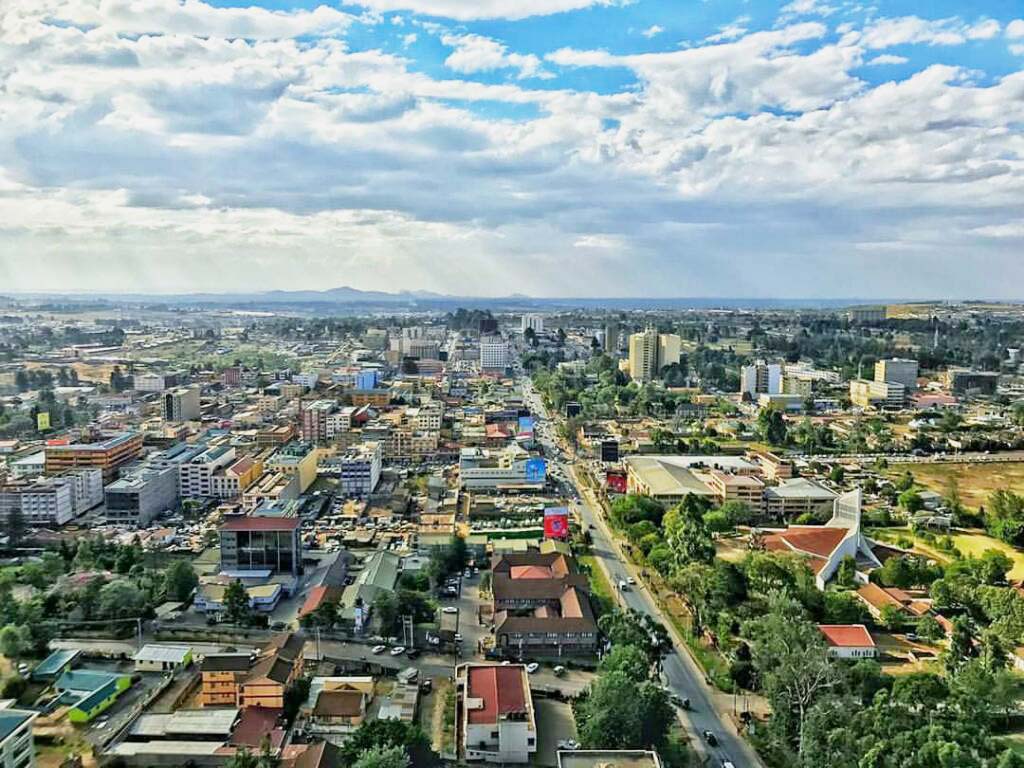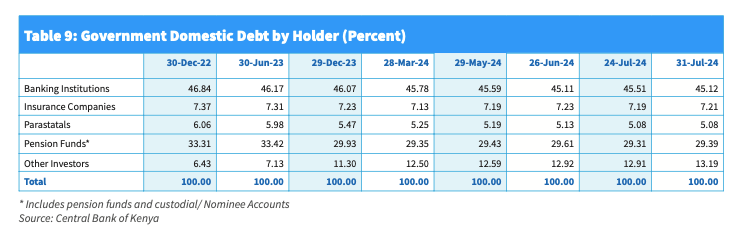
Subscribe to The Weekly Brief by The Kenyan Wall Street here.

Why Moody’s Downgraded 3 of Kenya’s Biggest Banks
Last month, shortly after downgrading Kenya’s credit ratings, the ratings agency Moody’s Ratings also downgraded the long-term deposit ratings of KCB Bank, Equity Bank and Co-operative Bank of Kenya, to Caa1 negative from B3, on the weakened government credit profile.
- •The three lenders, Moody’s says, have high exposure to sovereign debt through their holdings of government securities which stand at around 2.5, 2.4 and 1.6 times of their tangible common equity as of March 2024.
- •According to Q1 2024 results, the three listed lenders increased their investments in government securities by 40%, 16% and 12% respectively.
- •Other lenders such as Standard Chartered, Absa, NCBA, DTB and Stanbic have progressively scaled down their holdings of government securities despite favorable interest rates on offer.
“The banks’ high sovereign exposure, mainly in the form of government debt securities held as part of their liquid assets, renders the banks’ capital, profitability and liquidity vulnerable to a sovereign stress event,” Moody’s said. “In view of these links between sovereign and bank credit risk, these banks’ standalone credit profiles and deposit ratings are constrained by the Caa1 rating of the government.”
High problem loans stood at 18.9%, 14% and 14-5% of gross loans respectively, reflecting high asset risks coupled with weakening asset quality. In 2023, total gross NPLs in the banking sector stood at KSh 651 billion from KSh 503 billion a year prior.
Further, Moody’s noted that Kenyan households and corporates are affected by high lending rates and tight monetary conditions which translated to tax hikes and reduced spending.
“The concentration risk alluded to is not, at least in my view, as prominent for the affected banks. For instance government holdings comprise just about 23% of total assets in KCB Kenya, 24.7% in Equity Bank Kenya and 27.0% in Co-op Bank Kenya – all below the 30% mark. Additionally, the continued implementation of IFRS 9 provisioning continues to afford considerable buffers for the banking sector.” Ronny Chokaa, Senior Research Analyst at AIB-AXYS Africa told The Kenyan Wallstreet.
Credit ratings hold tremendous weight among global investors as they decide whether to invest in or divest from the country.
Read Past Issues and Subscribe to The Weekly Brief by The Kenyan Wall Street here.
“The move is however likely to affect future capital-raising initiatives for the firms including debt financing – piling pressure on borrowing costs over the medium term. On the equities side however, I expect trading activity on these counters to remain resilient despite the adverse rating,” Chokaa added.
“The market can stay irrational longer than you can stay solvent.”
-John Maynard Keynes
Eldoret Set to Become Kenya’s 5th City

“Skyline of Eldoret” By Shadychiri – Own work, CC BY-SA 4.0.
One of the founding legends of Eldoret, which is set to become Kenya’s fifth city this week, is that its location was decided because a loaded safe fell off a cart in the early 1900s.
Instead of loading it back on to the cart and moving on with their journey, the Boer families who were migrating from South Africa in search of a new home decided to just build a structure around it. That structure became a branch of the Standard Bank of South Africa, which survives today as Africa’s largest bank by assets, with a presence in Kenya through Stanbic Bank.
A century later, Eldoret is now home to more than 475, 000 people, which is twice the threshold population needed to get a city charter. It is a crucial node in the Western region and beyond, providing a gateway to Uganda and Central Africa. It has the makings of a city, in the form of an international airport, multiple bank branches-including one of the seven branches of Central Bank. It also has a thriving central business district, a rapidly growing metropolis, and a storied history as “the City of Champions.”
Among the Uasin Gishu county government’s big plans including marketing the city as a business hub, investing heavily in infrastructure and facilities, and changing the city’s spatial plans to allow for skyscrapers. It is also considering a plan to grow the city’s current boundaries by more than 100% to accomodate the expected population growth.
Interview of the Week
Have a great week!
Read Past Issues and Subscribe to The Weekly Brief by The Kenyan Wall Street here.





